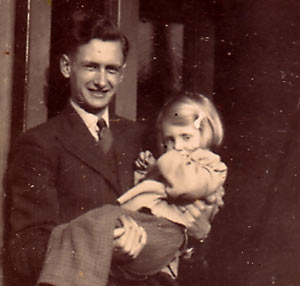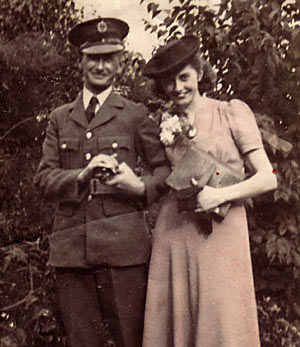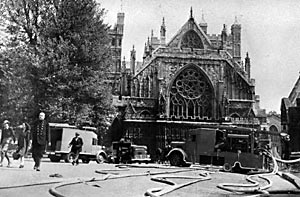
Exeter Stories
Exeter folk and friends in their own words - 1890's to the 1990's │ << Previous story │ Next story >> │
Olive Johnson nee Nibbs - sheltering from the blitz in 1942
The Blitz certainly changed the face of the County Town and the character which was so loved by people of my age who spent their childhood in the city has never been replaced by the rather heartless buildings, roads, one-way streets and poor parking areas. Fortunately, after such a terrific battering as the Blitz gave it, we still have most of the buildings for which Exeter is famed, notably, the Cathedral. This, when one looked at the damage elsewhere in the centre of the city, was a miracle.
24th and 25th April 1942
I remember well the two nights prior to the 'big one' on the 4th May, 1942. Perhaps it was as well that we were unaware of what was to come. Living, as my parents then did, on the outskirts of the city, at an area between Whipton and Heavitree, we felt a lot safer than the people living in the heart of Exeter, but we didn't get off completely lightly. There were several stray bombs dropped in our area which caused great concern even though one of them didn't explode. Of course, we always had the fear that one night, Exeter would 'get it'. On the first night of bombing, most Exeter citizens who had come through it without personal damage, were frightened by radio reports that 'this was only the start'. My fiance's parents' home at the lower end of Paris Street was fire-bombed and completely destroyed on the second night of random bombing, so it was fortunate that his family had travelled out to Broadclyst for shelter in the home of his grandparents, taking with them a few items of personal need, plus the letters which the postman had dropped through their letterbox, amongst them being a letter from 'His Majesty' telling my fiance where to book-in for the RAFVR for which he had been waiting. Ironically, had this not arrived on that particular day, it would have burned with the rest of the house at the next night's bombing and who knows what difference that might have made to both our lives!
Escape to the countryside
We had a house full of evacuees and several family members from London which had already suffered terrible air-raids night after night for months, so my parents had a lot of responsibility on their hands, and with his parents and family now temporarily homeless and staying in Broadclyst, it was considered sensible for my fiance and me to take my niece, Patricia, then a toddler, to Broadclyst for the next few nights; should the bombings continue. 'Charles' the furniture shop in the High Street where my fiance worked as a salesman, had already been destroyed by fire.
We set out to walk to Broadclyst with Pat in her wheelchair. What an exodus we joined! It seemed that everyone and his dog had the same idea! Literally crowds of hikers filled the road to Broadclyst, some deciding not to go further than bushes alongside the road, where they were settling themselves in blankets to while away the night. We continued to the grandparents' home, where we found most of the family - nowhere to sleep but just glad to be away from the city. As the house was full, we went along to the village hall to see if there was room there for the three of us. That was crowded as it had never been before! Some people were even hunching on the bench in the bus stop. There was no comfort for anyone - just the relief that it was safer there than in Exeter. Strangely there was no noise from the direction of the airport at Honiton Clyst - perhaps for strategistic reasons they preferred to keep hidden for as long as possible. When the next raid started, we gazed in wonder at the huge halo of fire which lit up the skyline over Exeter and wondered how long we would wait for our own planes to combat the bombers. It was a long frightening night for everybody even as far away as Broadclyst.
The aftermath
We returned home with our charge and then walked the three miles into Exeter, where chaos reigned. Wherever one tried to walk, there were water hoses across the roads, which were covered with slates, bricks, glass and rubble - and the smell of burnt wood purveyed the air. Bampfylde Street where I had attended 'The School of Office Training' for a year after leaving Bishop Blackall School was demolished and the lady owner, was wandering around, looking quite dazed! Bampfylde House was razed to the ground with all the other buildings. Back in the Sidwell Street area, Standfield & White's garage had gone with all the surrounding buildings in London Inn Square - in fact it was quite impossible to remember what had actually been there prior to the raids. Opposite the Guildhall, which survived, the biggest shops had been obliterated, including Bobby's and Colson's - all so close to the Cathedral behind them, that it is almost impossible to understand how that was missed, at least apart from one wing, but with South Street also badly hit, it would seem that the Cathedral had sat on an island in all its glory whilst all around was reduced to ruin.
After training, I had been engaged in secretarial work for the owner of the chain of chemist shops, called 'Holman Ham and Co' scattered around in the Devon area. The Warehouse and offices in the Lower Market in Fore Street had been lost completely, with the shop 'Fouracres' so Mr. Phillip Rowsell and his son Donald, had to search for another building in which to house a new stock of chemist supplies. I remember the occasion when our office staff got together to be told of their progress, one of our youngest staff members, called Millie, who herself was a Cockney evacuee could only weep and say, "Oh, them poor little kitties!" We had, before the Blitz, found a pregnant cat in the market premises and had adopted her and her kittens.
A double-fronted shop was found in the High Street in Exmouth and was used as temporary premises for stocking chemistries. It meant a daily train trip each day, which was not particularly welcome, but at least, we did occasionally have a nice walk on the front at Exmouth during our lunch break.
A Strange Happening
After the raid (4th May 1942 editor), my mother took a walk into Exeter to check up on the Palace Gate Church Hall and the Church. The latter was safe, but the Church Hall was just rubble. She walked through the Cathedral Yard area (see photo above) to the Palace Gate road. Complete chaos of course, but one very strange thing happened. She stood looking at the ruins of the Hall, which had held so many happy memories for her - Tuesday afternoons Women's League ... Church meetings ... Sunday School, Brownies, Guides, Scouts etc. so sad! All around was rubble, burnt wood and paper, lots of it. She sadly bent down and picked up a burnt sheet and realised that it was a page from the Church Records - with hand-written names on it ... amongst it was the name, Olive May Nibbs! She was almost in tears by this time, but brought it home to show us all. It apparently was the list of names of new babies whose parents wanted them to be dedicated ... the Baptist Church doesn't baptise babies, but dedicates them, with their two parents pledging to guide their children sensibly to adulthood - when baptism is then their personal option if they so wish. That piece of paper was shown all around our large family - but is now no more! I would have framed it!
© 2006 Olive Johnson - David Cornforth
Olive Johnson nee Nibbs was born and brought up in Exeter. Her father was employed at Standfield and White, in Sidwell Street. The family lived in Weirfield Road in 1920. She married in 1942 and moved away from the city. In these extracts from her emails, she remembers the Exeter blitz.
 Olive's fiance, Cliff and the
toddler Pat
Olive's fiance, Cliff and the
toddler Pat  Olive and Cliff on their wedding
day
Olive and Cliff on their wedding
day  Firefighters
hoses criss cross Cathedral Yard after the raid. Photo courtesy
Express & Echo
Firefighters
hoses criss cross Cathedral Yard after the raid. Photo courtesy
Express & Echo
│ Top of Page │